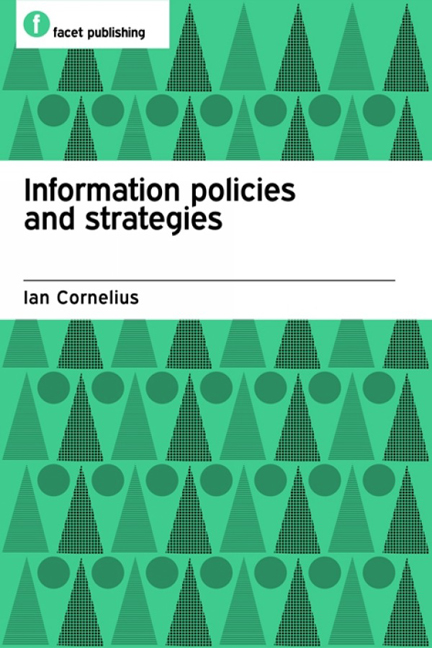Book contents
- Frontmatter
- Dedication
- Contents
- Preface
- 1 Introduction
- Part 1 Contexts for information policy
- Part 2 Information policy sectors
- 5 Censorship, freedom of speech and freedom of expression
- 6 Arguments for protecting speech
- 7 Privacy and data protection
- 8 Freedom of information
- 9 Intellectual property
- Part 3 Conclusion
- References and reading list
- Index
9 - Intellectual property
from Part 2 - Information policy sectors
Published online by Cambridge University Press: 08 June 2018
- Frontmatter
- Dedication
- Contents
- Preface
- 1 Introduction
- Part 1 Contexts for information policy
- Part 2 Information policy sectors
- 5 Censorship, freedom of speech and freedom of expression
- 6 Arguments for protecting speech
- 7 Privacy and data protection
- 8 Freedom of information
- 9 Intellectual property
- Part 3 Conclusion
- References and reading list
- Index
Summary
INTELLECTUAL PROPERTY is an area of interest because governments have a different set of interests from those of citizens, and citizens themselves have conflicting interests according to the role they are playing. Citizens can be both consumers and creators of intellectual property, seeking to protect creators’ rights while simultaneously anxious to secure the widest possible access to products. Governments, acting also as both producers and consumers, do not have the same interest in protecting creators’ rights because they are not dependent on the income. Governments do have a secondary interest in creators’ profits because they may enjoy tax revenues from the creator's work or from by-products of it. Successful creative activity leads not just to books, films, paintings, other art and performances, but also to merchandising – the T-shirts and mugs – that mark an increase in economic activity and hence tax revenues. There are two other secondary government interests. One is concern that they may be pilloried for failing to protect both the economic interests of living artists and the rights to access that the mass of citizens wish to enjoy. The other is concern that the activities of artists may effect a disturbance in the political balance, as art often criticizes power, especially when the exercise of political power against those unable to respond evokes satirical artistic comment. What better way to guard against this than to ensure that artists are enveloped within the established system of national and community rewards and have maximum opportunities to create new work and to distribute it, while at the same time ensuring that the population at large has easy access to this work through the provision of free public libraries, museums and art galleries, and subsidized theatre performances?
This concern for the living artist and the art-hungry citizen may be the popular image of talk about intellectual property, but the reality is different, and the reality of government interest is different. Intellectual property law protects all intellectual property, not just that which can be labelled artistic. So, all new knowledge, all scientific work, all engineering and architectural realizations of new inventions and discoveries, and even all repackaging in new forms of existing knowledge (such as school textbooks), is covered by law, international treaties, and national and international organizations.
- Type
- Chapter
- Information
- Information Policies and Strategies , pp. 157 - 174Publisher: FacetPrint publication year: 2010



